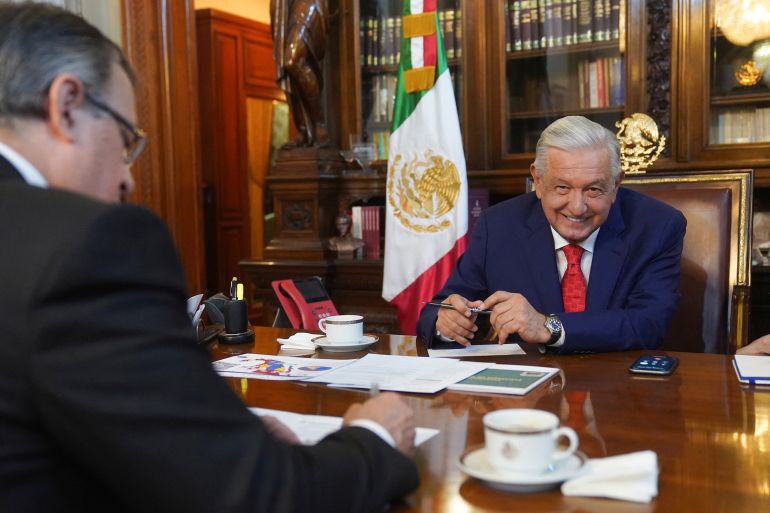Mexican government sends marines to take over private rail line
The administration of President López Obrador has promised to compensate the company for the rail line’s use.

The government of Mexican President Andrés Manuel López Obrador has deployed marines to the country’s south to occupy a section of railroad operated by a private conglomerate.
Officials called the measure “temporary” and in the “public interest”, as the government works to update a rail-to-sea network on the Isthmus of Tehuantepec, a narrow region of land between the Gulf of Mexico and the Pacific Ocean.
Keep reading
list of 3 itemsMexico’s president slams calls for US military to target cartels
Mexico’s high court annuls part of controversial electoral reform
That project, dubbed the Inter-Oceanic Corridor, is intended to help Mexico boost its economy and compete with the Panama Canal, a primary conduit for trade in the region.
Friday’s railroad takeover, however, caught the transportation company Grupo Mexico Transportes off-guard, according to a statement it released in the aftermath.
“The surprising and unusual takeover of the installations by the armed forces is being analyzed by Grupo Mexico Transportes, its investors and advisers,” the company said. Its shares dropped by more than four percent on Friday afternoon.
The Mexican government has promised to compensate Grupo Mexico Transportes for the seizure, which involves approximately 120km (75 miles) of rail, between Medias Aguas and the port city of Coatzacoalcos.
The company said that trains were continuing to operate on the line “with the surveillance of the armed forces”. The military takeover took place at about 6am local time (12:00 GMT).
This is not the first time the López Obrador administration has been accused of seizing transportation infrastructure for government use.
In March, the United States-based company Vulcan Materials alleged that Mexican police and military members illegally forced their way onto docks at a port that it operated in Punta Venado, along the Caribbean coast.
Once there, the soldiers allegedly facilitated the unloading of cement, crushed stones and other materials on behalf of the Mexican company Cemex — materials destined for the government’s Mayan Train project on the Yucatán Peninsula.
The incident prompted outcry in the US, with Republican Senator Katie Britt of Alabama calling the move “unlawful and unacceptable”. The US State Department, meanwhile, said it was “concerned about the fair treatment of our companies in Mexico”.
López Obrador has championed the Mayan Train project, a 1,500km (950-mile) rail line designed to circle the Yucatán Peninsula, connecting many popular tourist sites.
But the project, estimated to cost $16bn, has faced much opposition, including from Indigenous, environmental and archaeological groups concerned about how it might affect fragile ecosystems and historical sites in the region.
On Thursday, Mexico’s Supreme Court issued a setback to López Obrador when it ruled that the government had no right to rule the Mayan Train and other infrastructure projects “national security” issues to facilitate construction.
The train project was briefly put on hold in 2022 after an injunction was issued for failing to file an environmental impact statement. López Obrador, whose term ends in September 2024, has been racing to complete the rail line before exiting office.
In Thursday’s ruling, the Supreme Court — a body with which López Obrador has had an adversarial relationship — said that the “national security” designation would violate transparency laws about public works.
But López Obrador responded to the court’s decision later on Thursday by issuing an order in the Official Gazette of the Federation, where government rules and regulations are published, reinstating the “national security” designation.
The order would cover projects like the Mayan Train as well as the Isthmus of Tehuantepec rail-to-sea network and several airports, shielding them from normal permitting processes.